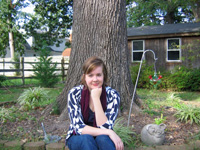 Dear Mr. and Mrs. Smith
Dear Mr. and Mrs. Smith
I know you have already received your letter in which
there are no details of your son's death on the third
of October in Mogadishu, Somalia. I know it came as a telegram,
folded, inconspicuous, brought to you by two men in uniform,
arms folded tightly behind their backs, haircuts newly trimmed.
There was no sweat on their foreheads because they enjoyed the air
conditioning in Washington DC; one extended his hand, but
his mouth was the thin grim line he wore because he knew
what he was about to tell you. At 0'dark thirty we awoke to hurry
up and wait for orders. Your son effervesced
laughter as contagion, even in a combat situation.
When they told us to get ready, the voice on the loudspeaker
barked that we wouldn't be gone long enough
to need water. Tense. That was all we knew of the conditions
in Somalia. Need to know basis. Nobody thought
we needed to know. The sun hung in the sky with the same authority
as the black birds, like bricks, and our legs swung out of the beast
as we looked down at the blue concrete below us.
The horizon wavered like the desert and your son said he was glad
there were no strip malls in Mogadishu.
1542 hours the assault
began, ropes slinking to the ground from the bird
but our eyes scarred and blind from the poison gas cloud
of dust the blades kicked up. A private first class fell, breaking
his back. That's when they came on us like ants
with semiautomatic weapons, protecting their hive
from the tramplings of a child. The crates of food
we brought rotted on the docks. That's why we went in.
They shot down a metal bird like she was a clay disc.
She was the first to slip out of the sky
15 miles off her target; we could smell her
before we could see the contagion of her smoke
hit the sky. As rangers fell to unwelcome earth, the impetus
of our training shot arms out to lift and carry and drag
when the necessity came. He hesitated to shoot the men
who pulled women in front of them as body armor.
In the jaundiced eyes of children we saw the death of a country
from the inside out, no vaccine, no antidote to
the epidemic of fear,
(that was what the newspapers back home called it)
and it was only seconds before we started shooting children
who carried semiautomatic weapons as extensions
of their own arms. It became us versus them, and days later
we recalled that it had been mothers and sons and daughters
in whose bodies the violence of self-preservation
a parasite grew, devouring their own self-worth.
I have struggled to remember since that day how or when
he got shot.
The bodies piled and were piled up, the life gone
and so too the distinction of being a human. We shot
at them where they stood within their fortresses of dead
bodies and beside me I heard the crunch of bullet
against bone. He didn't notice at first, his finger still
tight on the trigger, and we heard that the second bird
had been pulled out of the sky. I watched him go down
but it was another ranger who dove to take his place
in the fighting line. The convoy had turned the wrong way,
lost in the metropolis of destruction. The abandonment
was cruel. We took shelter from necessity; the medic found
the invader—and pulled it from your son's leg.
He never fell
to the hands of the Moags, he never suffered
under the arrogant apathetic cruelty of those
we found out later took the pilot and dragged
him down the street and sent the video home so his mother
and father could see the lifeless shell and wonder if he
would ever make it home. Your son's life pumped
out of him faster than I have ever seen but he held
day's hand through the afternoon and even on
into night, lingering as long as he could.
In the femoral artery clenched his heart, and our fingers
did the best they could to stop that draining up.
It was never Moags but rangers who held the thick rope
of your son's life in our fingers. We traded off as long as
he needed us to. In the dim light of our makeshift encampment
we couldn't see the color of his face and the way it dripped
with resignation. He had given too many pints of blood
that day, donated it all to our uniforms so that we might take
some of him with us when we saw the sun rise again
the next morning. He asked for water, but we had none
and he joked that
if Mogadishu had strip malls he could get a Coca Cola.
Your son held the hand
of the medic for as long as his punctured body would allow.
He laughed a little or what we thought was a laugh,
it was too hard to tell in his throttled voice. He said,
They never wanted me to be a ranger. I hope
they get it now, that I had to lead the way,
of my own accord.
When he let go of the medic's hand and the sun fell
from the sky like those big black birds,
someone said a prayer.
I know you have already
received your telegram from the hill and perhaps it sits
on your kitchen counter heavily but still threatens to blow
away. Maybe if you do not read it, it has not happened,
but when we fold the flag over your son's coffin, he returns
with honor.








